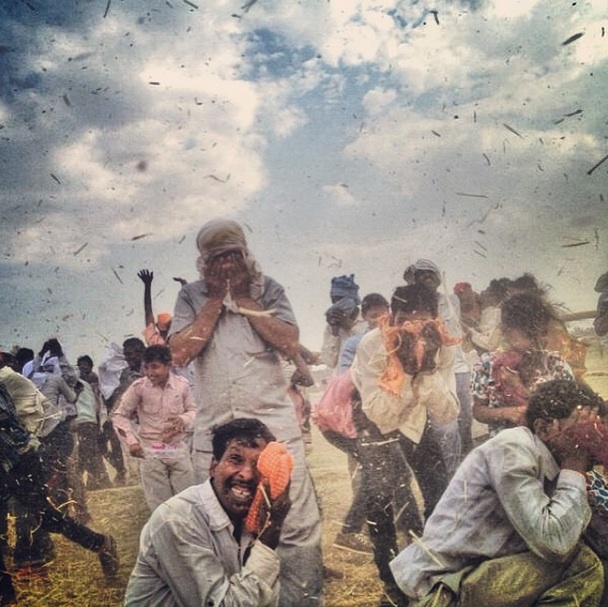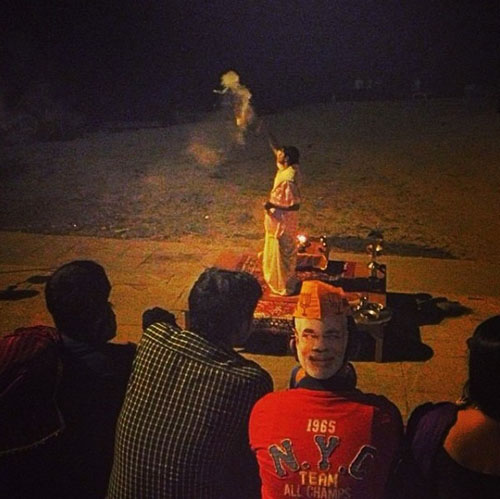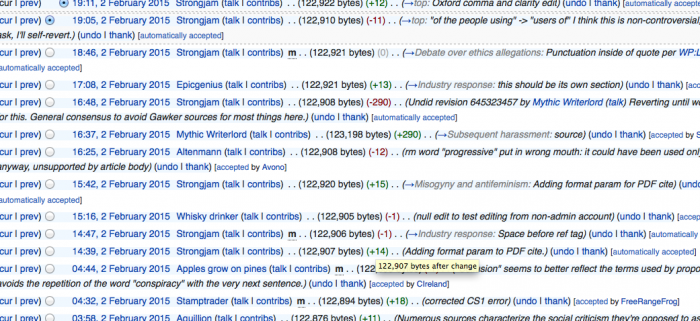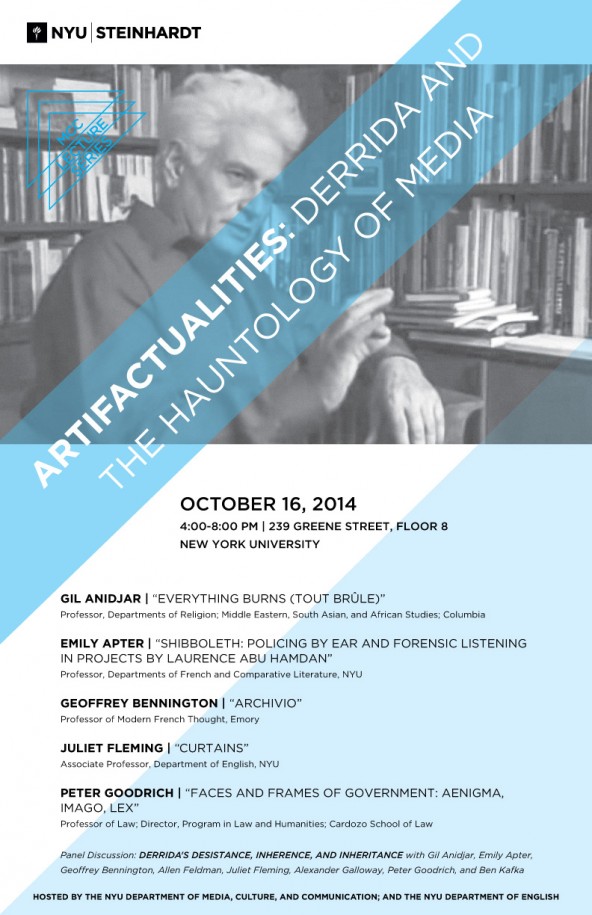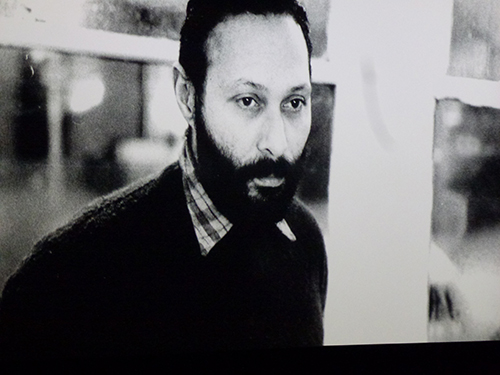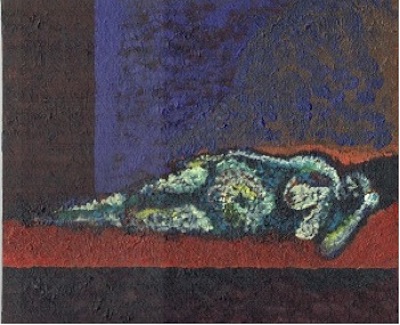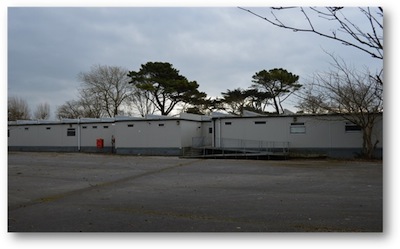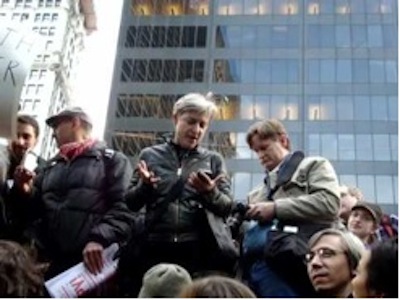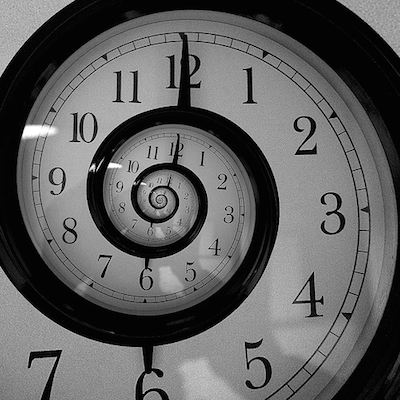Engulfed in a momentary dust storm induced by Bharatiya Janta Party candidate Narendra Modi’s helicopter as he departs from a public meeting in Robertsganj, Benaras (Varanasi), members of the crowd attempt to cover their faces and eyes as dry … Continue reading “The Majority of Democracy”
Category:
They Always Speak with their Eyes Cast Down: Dalits on the Margin of Indian Democracy
Gopal GuruMuch like an imitation of reality, a Narendra Modi fan watches the Ganga Aarti [ritual worship] on the banks of Benares (Varanasi), with a mask of the leader placed behind his head, facing away from the priest. Photo by … Continue reading “They Always Speak with their Eyes Cast Down: Dalits on the Margin of Indian Democracy”
The Affective Labor of Wikipedia: GamerGate, Harassment, and Peer Production.
Michael MandibergThe Wikipedia Arbitration Committee (ArbCom) just completed the process of sanctioning a number of editors over edits to the Gamergate controversy page. This has been a controversial decision, with many parties issuing statements, including the Wikimedia Foundation, two of the … Continue reading “The Affective Labor of Wikipedia: GamerGate, Harassment, and Peer Production.”
Nothing Unintentional
Nadia Abu El-HajThis post originally appeared on the London Review of Books Blog on July 29, 2014. The Palestinian body count in Gaza has passed 1000, with more than 5000 wounded. Over 70 per cent of the casualties are civilians, including more … Continue reading “Nothing Unintentional”
Artifactualities: Derrida and the Hauntology of Media
Allen FeldmanArtifactualities: Derrida and the Hauntology of Media Thursday, October 16, 2014 4:00-8:00 PM | 239 Greene Street, Floor 8 | New York University RSVP Jacques Derrida was the most brilliant and influential philosopher of media of our time. He had … Continue reading “Artifactualities: Derrida and the Hauntology of Media”
Genocidal desistance in Gaza
Allen FeldmanAn earlier version of this post was published by Open Democracy on August 12, 2014. In response to the current outbreak of vicious siege warfare in Gaza, satirist John Oliver, on his weekly cable show, reviewed the past decade of … Continue reading “Genocidal desistance in Gaza”
Stuart Hall's South African Legacy
sean jacobsMy early university education at the then-very white University of Cape Town coincided with South Africa’s transition from Apartheid to democracy. Stuart Hall didn’t feature much, despite the fact, as I would later learn, I was indirectly influenced by … Continue reading “Stuart Hall's South African Legacy”
In a Queer Time and Space: Slowly, Closely, Over Reading Elizabeth Freeman’s Time Binds
Michael O'Rourke and Anne MulhallThis Social Text: Periscope dossier arises from a two-day intensive seminar, Queer Temporalities: Reading Elizabeth Freeman’s Time Binds, a collaborative event co-organized by The(e)ories: Critical Theory and Sexuality Studies, which was held at University College Dublin, Ireland in November 2011. … Continue reading “In a Queer Time and Space: Slowly, Closely, Over Reading Elizabeth Freeman’s Time Binds”
Slow Reading
Ben DaviesI want to “linger, to dally, to take pleasure in tarrying” over Elizabeth Freeman’s concept of slow reading. Indeed, I want to read slowly, to take time, to take my time. Ever since the advent of New Criticism in the … Continue reading “Slow Reading”
‘Erotic Effusions’ in Time Binds: Queer Temporalities, Queer Histories
Maria MulvanyThe promise of a voluptuous encounter with the past is arguably one of the most seductive aspects of Time Binds. Emboldened by a refusal to “give up on sex and sociability” (xxii) in the face of what she identifies as … Continue reading “‘Erotic Effusions’ in Time Binds: Queer Temporalities, Queer Histories”
Trans Forming Time
Jessica Robyn CadwalladerSusan Stryker’s 1993 performance piece, “Transgender Rage” later became “My Notes to Victor Frankenstein Above the Village of Chamounix: Performing Transgender Rage” (Rage). Sometime later, after queer theory had been declared dead, resurrected, dismembered and sutured together again several times, … Continue reading “Trans Forming Time”
Après-Coup in extremis: Futurism and A-Historicity in the Work of Freeman, Lacan and Woolf
Eve WatsonOne of the many achievements of Beth Freeman’s Time Binds is its persistent interrogation of how temporality produces subjectivity, as opposed to the other way around. This preoccupation which is defined by Freeman as “queer temporality” is a queer project … Continue reading “Après-Coup in extremis: Futurism and A-Historicity in the Work of Freeman, Lacan and Woolf”
Dead Time: Queer Temporalities and the Deportation Regime
Anne MulhallAnalyzing the sexual citation of chattel slavery in interracial S/M role play, Freeman reaches a hopeful conclusion from what might seem unpromising material, given the structural racism that has endured into the present as one legacy of colonial dispossession and … Continue reading “Dead Time: Queer Temporalities and the Deportation Regime”
Time’s Tangles
Michael O'RourkeElizabeth Freeman admits that in this book she is committed to overcloseness, to an overreading practice as overdetermined as queerness itself. She explains that “’Queer’ cannot signal a purely deconstructive move or position of pure negativity” because that would “risk … Continue reading “Time’s Tangles”
Response
Elizabeth FreemanI’d like to begin with Ben Davies’s concept of “slow reading” as a way of marking the deep pleasures, anxieties, and inspiration I felt reading these responses to Time Binds. “Through reading slowly,” Davies writes, “we put ourselves at risk … Continue reading “Response”


